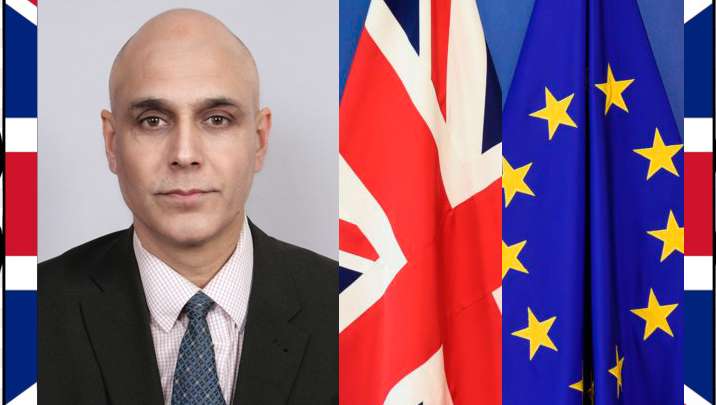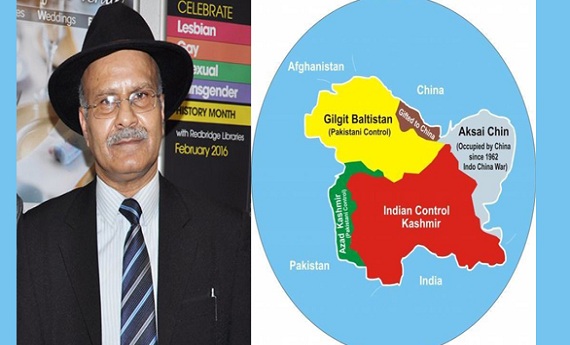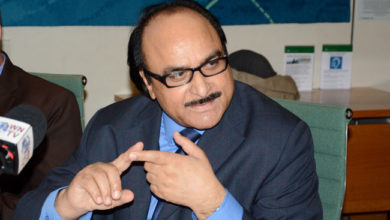Why A Second Brexit Referendum?

Written By: Qasim Swati (Manchester, UK)
Despite the continuous stubbornness, insistence and determination of the Brexiteers and, particularly the Prime Minister Theresa May, for getting on with Brexit, the Remainers still believe and are optimistic of having a second Brexit vote.
Branded with and called by various names, such as, the ‘Remainers’, ‘Remoaners’ and campaigners of a ‘People’s Vote’, those who want to stay in the EU are of the opinion that there should be a second referendum on the Brexit deal and that the people of the United Kingdom should be given a chance to have a ‘Final Say’ on Brexit or to leave or remain in the European Union. Some of the arguments, given by the Remainers in favour of a second Brexit referendum, include the following:
Idealism versus Realism: The campaigners of a ‘People’s Vote’ believe that the people of the UK had not been provided with any definitive vision at the time of June 2016 EU Referendum about what Brexit would mean in reality. Now, even a great number of those who voted for leaving the membership of the European Union have started realising about what they did in 2016, as a result of the possible consequences and practical barriers, hindrances and obstacles while meeting the 2016 decision of the British people to leave the EU.
Appearances Are Often Deceptive: The campaigners for a second vote on Brexit argue that the First 2016 EU referendum had been held in a wrong way, in the first place. There were certain things wrong with the 2016 Brexit vote. One of the most obvious defects of the referendum process was the lack of genuine information. The voters had been deceived by the campaigners of both sides with fake, hollow and unrealistic slogans. On one hand, there was an infamous or notorious message promising a windfall or bonanza for the NHS on the Leave Bus, attracting people with saving £350m on a weekly basis in the event of leaving the European Union. On the other hand, the economic disaster predicted by the Remainers the day after a Leave Vote was also not true, as no such thing like that situation happened, as warned by those who wanted the UK to stay in the EU. Both the costs of immigration by Leavers and benefits by Remainers were exaggerated by both sides, and, thus, misled the people to convince them for supporting the cause of each side in the referendum, as published on Thursday, 31 May, 2018, in the Free Learning from The Open University.
United We Stand, Divided We Fall: Besides differences with certain countries of the world (particularly Iran) the relations between the United Kingdom and Russia are not pleasant with each other on several issues and grounds. One of the main reasons of bad ties between the two countries is the Russian involvement in poisoning its former spies on the streets of Britain. It was in November, 2006 that Alexander Litvinenko, the ex-officer of the Russian Federal Security Service (FSB) and KGB was poisoned in London, leading to his death. The death of Alexander Litvinenko deteriorated the relations between Russia and the UK. Recently, in March, 2018, Sergei Skripal (an ex-Russian military intelligence officer and double agent for the UK’s intelligent services) and his daughter (Yulia Skripal) were poisoned in Salisbury, England, with a Novichok nerve agent, known as A-234, as mentioned by UK official sources. Again it was reported on July 9, 2018, that a British woman, Dawn Sturgess (a mother of three), died after being poisoned by a military-grade nerve agent, which the UK blames Russia for. In response to such nerve agent attack in the UK, more than 100 Russian diplomats were expelled from more than 20 countries, 18 of which were European Union states, as reported in the CNN (London) by Angela Dewan, Milena Veselinovic and Carol Jordan, on Wednesday, March 28, 2018. So, this was due to one of the other benefits of the UK membership of the EU that a large number of EU countries sided with the UK against Russia.
The Potential Danger of Anglophobia: Anti-English sentiment or Anglophobia means opposition to, dislike of, or hatred towards England or the English people. If we look at the results of the UK referendum on the EU membership, held on 23 June, 2016, by constituent countries, we will see that 62.00% of the Scottish voters had voted for remaining in the European Union. The Scottish National Party and the majority of the Scottish people negatively responded to the results of the referendum, as they wanted the United Kingdom to stay in the EU and are still of the opinion to keep the membership of the European Union. While responding to the unfavourable results of the referendum, the devolved Scottish Government declared that it would plan for a likely second Scottish Independence Referendum from the UK. On the next day of the referendum, June 24, 2016, the Scottish First Minister, Nicola Sturgeon, said Scotland had clearly voted for remaining in the European Union and that it was clear that the Scottish people could see their future as part of the EU. The former Scottish First Minister, Alex Salmond, also angrily responded to the results by saying that the vote was a ‘significant and material change’ in the position of Scotland within the United Kingdom and that he was sure of his party for implementing its manifesto to hold a second referendum.
Similarly, 55.78% of voters in Northern Ireland had voted in favour of staying in the EU and the majority of the Northern Irish political parties were supporting the Remain Campaign for remaining in the EU. However, only 47.47% of the Welsh voters had voted for remaining in the EU and 52.53% were in favour of quitting the membership of the European Union, but, currently, the majority of the people in Wales seem to support staying in the EU instead.
As a result, such circumstances can create anti-English or anti-England feelings and emotions in other parts of the United Kingdom. Thus, this is significant, as argued by campaigners of the second Brexit referendum, to give the people of the UK a chance to have a final say in dealing with the Brexit issue, and create more Anglophiles instead of hatred for England and its people.
Age Matters While Handling Brexit: As more older people opted to leave the EU, a majority of young people (voters aged 18 – 24) wanted the UK to stay in the European Union. The campaigners for a second referendum on Brexit argue that a larger number of those who voted in favour of leaving the EU have already passed away, even in the last less than three years after the 2016 Referendum where the politicians are not yet able to come to a final conclusion on the outcome of the same referendum. This is what has emerged in The Telegraph on 24 September, 2017, when the former Leader of the Liberal Democrats and a strong supporter of staying in the EU, Mr. Nick Clegg, referred to the concern regarding age, in connection with Brexit. Being a Deputy Prime Minister in the coalition government with the Conservative Party, Nick Clegg, as reported in The Telegraph by Gordon Rayner, on September 24, 2017, suggested that Brexit should be put to a second referendum, as people who voted Leave were dying off. He further went on saying that ‘high point’ of support for Brexit has passed, because the oldest voters voted for Brexit in the largest numbers, but the young voters decided the other way round and voted to remain in the EU instead. When asked by the BBC’s Andrew Marr whether he was saying that Brexit voters were ‘dying off’, Nick Clegg replied, as “Well, I’m saying if you look at the demography, the oldest voters voted for Brexit in the largest numbers, the youngest voters did the opposite.” On the other hand, as Nick Clegg told the same BBC’s Andrew Marr again, as: “The last vote was …a sort of photo finish, there was only 650,000 votes in it. And how can I put this politely? Actually, I suspect that the high point of the Brexit vote has already passed. Crucially, young people who have to live with the consequences of that referendum vote and these botched negotiations overwhelmingly want something different.”
Greater London and Brexit: According to the latest official estimate of the population of London coming from the Office for National Statistics, the estimated population of Greater London in 2016 is 8,787,892, as updated on 2 July 2018. Organised into 33 local governments – the 32 London boroughs and the City of London, this region forms the administrative boundaries of London. 59.93% of people of Greater London have voted for staying in the European Union in the June 2016 EU Referendum. In a report on 15 September, 2018, accessed at www.london.gov.uk , the Mayor of London, Sadiq Khan, called for a national vote on any Brexit deal, alongside the option of staying in the EU. While believing the UK to be left by the government with two possible scenarios (a ‘bad deal’ or ‘no deal’ Brexit), he is of the opinion that this situation further exposes the lies and mistrusts sold to the public by the Brexiteers, which is far from what was promised during the EU referendum campaign. As suggested by the Mayor of London in the beginning of the year that Britain could have 500,000 fewer jobs, all over the country, by 2030 than remaining in the EU, if the UK left the EU without a deal. This could mean 87,000 fewer jobs just in London and up to £50 billion loss in investment across the country.
The 2016 EU Referendum Being the Over-simple Choice: In or Out: Those campaigning for a second vote on Brexit also complain that the June 2016 UK referendum for leaving or staying in the EU was just in the format of ‘In or Out’, which was not an accurate, appropriate and suitable way of asking the people to decide their future, in connection with their future relations with the EU. However, there are now several substitutes and alternatives to a hard Brexit, on one hand, and Remain on another, as published in the report by Free Learning from The Open University.
A Brexit Referendum Spending Probe: A Great Boost for a ‘People’s Vote’ Campaign: Another Brexit twist (a change in the way in which something happens) is going to take place amid the ongoing Brexit negotiation process, as the BBC reported on Thursday, 01 November 2018, about a probe into the Brexit referendum spending. Captioned as ‘Arron Banks faces Brexit referendum spending probe, it is reported by the BBC that Arron Banks and his Leave.EU campaign are being investigated by the National Crime Agency (NCA) for alleged offences committed at the EU referendum of 2016’. Born in Cheshire, Arron Banks is a Bristol-based insurance tycoon and has been a supporter of Tory Party until 2014 when he defected to UKIP, giving them £1m. Being thought to have given up to £9.6m to Leave.EU, he is said to be one of the biggest political donors in the history of the United Kingdom.
Not only Mr. Arron Banks, but also the chief executive of Leave.EU, Ms Liz Bilney, is said to have been referred to the National Crime Agency for investigation for the same alleged offences by the Electoral Commission. Both of them deny such allegations and any wrongdoing and believe that the issues will be thoroughly sorted out and that anyone involved in these allegations (including themselves) will be cleared or acquitted (declared innocent) of such claims, allegations or accusations. On one hand, Liz Bilney, hopes that all involved in the matter for investigation will be exonerated (absolved; pronounced not guilty) of these claims and charges successfully. On other hand, she blames the Electoral Commission for failing to understand the nature of the loan agreements (being the main reason of seeking probe into Arron Banks and the Leave.EU), and she also denies claims that the money had come from Russian sources.
Reacting to the news of Brexit referendum spending probe, the Labour MP, Stephen Kinnock, said that Brexit was a smaller matter than public trust in the source of political donations. Nevertheless, while talking to the BBC’s Politics Live programme, the Member of Parliament for the SNP, Kirsty Blackman, expressed his feelings, regarding this matter, as: “If people are found to be breaking electoral law, then, I think there is an issue that you look at the possible validity of the results.”
This would be a colossal damage to the notion of Brexit and a negative outcome for the Brexiteers, if these claims and allegations against Mr. Arron Banks, Liz Bilney and others involved in the matter proved to be true.
Keeping in minds the problems, complexity, confusion and uncertainty with the current situation arising from the Brexit negotiation and its far-reaching and long-term consequences, the Remainers or Remoaners (as dubbed by some hard-line Brexiteers), claim that there are some six chances for a Second Brexit Referendum, as published by Natasha Clark, in The Sun, on 19 September, 2018. The Remoaners (those who complain about or reject the outcome of the 2016 EU referendum on the UK’s membership of the European Union) believe that the following six opportunities for a Second Brexit Referendum are available which we should take advantage of to resolve the issue:
First: There is a chance for a second Brexit vote, in case there is no deal by January 2019 or if the Members of Parliaments reject the Brexit deal.
Second: This is possible in the form of a Commons motion when MPs vote on a Brexit deal.
Third: The Prime Minister could call a second referendum on Brexit, if MPs reject the deal.
Fourth: A second vote on Brexit is also likely, if a snap election was called either by Theresa May or by another successor.
Fifth: Another referendum can also happen, if MPs accept the deal for approval, but only if there is another vote.
Sixth: The Prime Minister could call on to secure a fresh mandate from the people of the UK to continue to sort the issue out, if there is no deal.
However, these are not only the Remainers or the campaigners for a ‘People’s Vote’ who predict or talk about a potential or possible chance of another referendum on Brexit, but a Conservative Treasury Minister/Financial Secretary to the Treasury, Mel Stride, while being interviewed by the Sky News and reported by James Blitz in the Financial Times on September 20, 2018, expressed his views about the chances of a second Brexit referendum which the people have noticed. For avoiding a second Brexit referendum, the minister urged the hard-line Tory MPs, like Jacob Rees-Mogg, to support the deal to be signed by the Prime Minister with the EU when she brings it before the Commons. If the Conservative Members of Parliament do not back the Prime Minister in what she is going to strike a deal with the EU about Brexit, then, there will be a risk of having another referendum on Brexit, as apprehended (anticipated, especially with anxiety, dread or fear) by the minister. Accordingly, Mr. Mel Stride carried on to say, as: “When we have a firm deal on the table, I suspect that those to the right of the party –the pro-Brexit wing- will be very concerned that if that deal does not prevail, they will end up in the situation where we could have a second referendum; or we could end up not leaving the EU altogether. There is a danger of that happening, if Chequers does not prevail.”
Qasim Swati is a freelance journalist, writer and human rights activist, based in the UK, and can be reached at: https://qasimswati.com or qasimswati2003@yahoo.co.uk.





